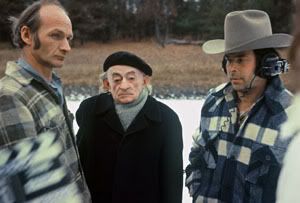
OK, it's by Werner Herzog, so I obviously love it.
But this is one of his fiction-ish films and it is remarkable for its close
 relationship with the characters in an almost loving and appreciative way. A socially awkward, ?alcoholic, musician gets released from an institution and along with a beaten down prostitute and his elderly neighbor, they move to the neighbor's nephew's town in rural Wisconsin. While Wisconsin is an improvement in many respects, these three simply do not form a family.
relationship with the characters in an almost loving and appreciative way. A socially awkward, ?alcoholic, musician gets released from an institution and along with a beaten down prostitute and his elderly neighbor, they move to the neighbor's nephew's town in rural Wisconsin. While Wisconsin is an improvement in many respects, these three simply do not form a family. Bruno Stroszek, the musician, appears at first as simple-minded, but soon shows that he is quite capable of extraordinary philosophy and a passion for music fulfilled in his instrument collection and his outdoor concerts for local apartment buildings. Eva, the sex worker, has a truly skeevie set of pimps who beat her for having sex with someone at the opening of the film and then again for not making enough money to get their stuff out of hock. And then again. They walk into Bruno's house and humiliate him, tearing apart his accordion and taking Eva off. Herr Scheitz, Bruno's neighbor, suggests that they all move to Wisconsin with him. Herr Scheitz' nephew is a humorous local mechanic native to Railroad Flats. His only German is to say, "What's loose? The dog is loose." But he is an endearing sort of fellow to offer his uncle a home and his odd friends work and a new life.

These three find solace with one another. Bruno needs companionship and affection, Herr Scheitz needs companionship and conversation, and Eva seems to need safety. But as time goes by, their support of each other is not enough. Upon entering the country, Bruno's beloved bird is confiscated. He left all of his instruments behind except his horn, which he plays atop the Empire State building on their way through New York, and his according, which is barely ever used again.
I kept thinking throughout the film that it was going to quickly spiral out of control and spend the last hour wallowing in horrible misery. But it doesn't. Yes, everything falls apart, but in a quirky, almost delightful way. These characters are not filled with pathos and self-mutilative desires. They try to keep it together. (Skip to the next paragraph if you want to keep the ending a surprise)
 Eva needs to take care of Eva, so she leaves with some truckers to go to Vancouver. Herr Scheitz concludes that the reposession of their trailer is a conspiracy and attempts to hold up the local bank. When he finds that it's closed, he and Bruno hold up the barbershop next door and then, after tossing the shotgun into the front seat of their car, run across the street to buy groceries. Herr Scheitz is arrested and Bruno runs off with a frozen turkey and the shotgun. It's almost madcap and relieves the oppressing misery of so many films which depict a downward spiral. And thank god! I can't handle another Sherry Baby. Ugh.
Eva needs to take care of Eva, so she leaves with some truckers to go to Vancouver. Herr Scheitz concludes that the reposession of their trailer is a conspiracy and attempts to hold up the local bank. When he finds that it's closed, he and Bruno hold up the barbershop next door and then, after tossing the shotgun into the front seat of their car, run across the street to buy groceries. Herr Scheitz is arrested and Bruno runs off with a frozen turkey and the shotgun. It's almost madcap and relieves the oppressing misery of so many films which depict a downward spiral. And thank god! I can't handle another Sherry Baby. Ugh. I think we all know the other shoe is going to drop. Nothing really ends in happily every after. So is it really illustrative of anything other than repetition or lack of creativity to tell the same miserable story again and again?
I hope to never tell such a miserable story as Sherry Baby or anything by Lars Von Trier. I am not a sadist, nor much of a masochist. It's not instructive to repeat the same narratives again and again, with no illustration of anything new or hopeful or even causal. Where do we make mistakes? Are there good things that come from mistakes? If we all live in misery forever and ever and over and over again, well, lets just nuke the place. But we don't. There are wonderful redeeming elements in life and we do think that it will change and maybe be better. Enough with the ominous dread. Even sad endings can be more than miserable.
Which is why Stroszek is great! There's a dancing chicken at the end! Chickens are always funny and this one is magnificent.